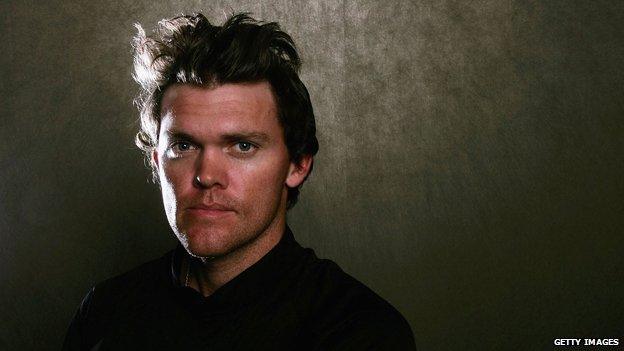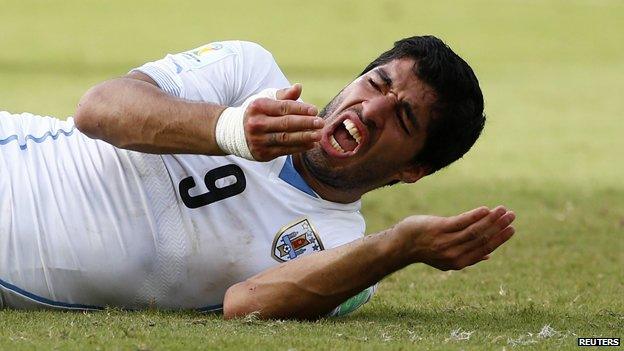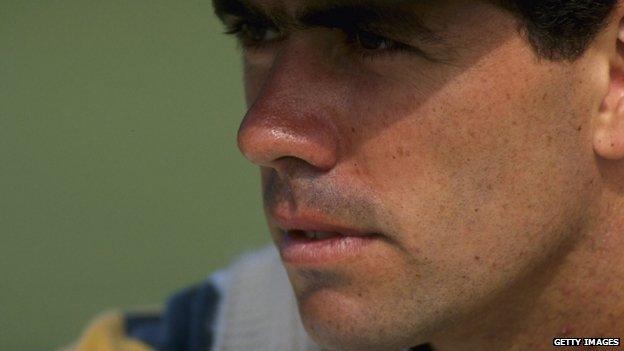Lou Vincent: The most brutal form of apology
- Published

Lou Vincent
The cricketer Lou Vincent has admitted attempting to fix matches. His apology came in stark style.
He exhales loudly. Then he begins his statement: "My name is Lou Vincent and I am a cheat."
The former New Zealand cricketer, in 10 words, admits what he has done, how he has contravened and undermined his own sport by accepting money for match-fixing. Viewers are left in no doubt.
Vincent, at the age of 35, has been banned for life from playing, coaching or participating in any other way in organised cricket after breaching 18 anti-corruption rules in matches played in 2008 and 2011.
Even so, the nature of the opening of his video confession - in which he goes on to say he has "shamed" his sport, country and family - seems unusually stark.
The formula of the opening words is the same as that used by some members of Alcoholics Anonymous. Those attending at meetings are not compelled to say: "My name is XXXX and I am an alcoholic." But many choose to do so, citing its cathartic effect and the creation of a sense of community.
Vincent, who has suffered from depression, is unlikely to feel the same immediate mutual support from his fellow cricketers. But might he eventually gain respect for his statement, in which he also says he wants to face up to what he has done "like a man and accept the consequences"?
"It's very healthy," says Cary Cooper, professor of organisational psychology and health at Lancaster University. "You don't get enough of people admitting when they've done something wrong, particularly in the workplace."

Uruguayan footballer Luis Suarez has faced criticism over his initial refusal to apologise for biting Italian defender Giorgio Chiellini in a World Cup match. He has since given a qualified apology - one that expressed sympathy for his victim but did not fully address Suarez's culpability and ongoing problem.
"What the cricketer has done is completely unlike the Suarez situation," says Cooper. "If Suarez had come out straight away and said he'd done wrong under the stress of the situation he would have received much more sympathy. What's happened here in cricket will raise Vincent in people's estimation. The timing is absolutely key."
Vincent recorded his statement after admitting to the England and Wales Cricket Board (ECB) that he had committed match-fixing offences in Twenty20 games when he played for Lancashire and Sussex. It pre-empted the ECB's own announcement.
Sussex County Cricket Club has welcomed the punishment of Vincent, who has played in 23 Tests and 102 one-day internationals, external. "The episode has been a very difficult time for our players, staff and indeed all supporters of Sussex Cricket," says chief executive Zac Toumazi. "We are determined to do all we can to drive this issue away from our game and remain vigilant and committed in doing so."
Cricket is keen to clean up its image after revelations going back more than a decade, when it was revealed the South African captain Hansie Cronje had fixed matches.
In his confession in 2000, Cronje opened by saying he had been a Christian all his life and had tried to "walk the way the Lord wanted me to walk".

Hansie Cronje

South Africa cricket captain Hanse Cronje confessed to match fixing in 2000
Right-handed middle-order batsman appointed South Africa captain in 1994, aged 24
Charged by Indian police in April 2000 with fixing one-day international matches, but initially denied wrongdoing
Sacked as captain four days later when he changed his story and admitted taking money to provide information to gambling interests
Banned from cricket for life in June 2000
Died in plane crash in South Africa's Western Cape in 2002

The golfer Tiger Woods, in his scripted 2010 apology, external in front of the world's media for his marital infidelities, also adopted a more gradual introduction to the description of his wrongdoings than Vincent.
"Good morning. And thank you for joining me," he said. "Many of you in the room are my friends. Many of you in this room know me. Many of you have cheered for me, or worked with me, or supported me, and now, every one of you has good reason to be critical of me.
"I want to say to each of you, simply, and directly, I am deeply sorry for my irresponsible and selfish behaviour I engaged in."
Could Vincent's more direct statement lead to some form of public redemption, even if it does not, and cannot, involve any future involvement with cricket?
"What he has done is probably the best way," says speechwriter and presentation coach Max Atkinson, external. "It reminds me of (Liberal Democrat leader) Paddy Ashdown in 1992 admitting he had had an affair. That worked. He came across as honest. It's best just to come out and say it."
The difference is that Ashdown could argue his personal life did not interfere with his professional one. Like Cronje, Vincent cannot.
But Peter Davies, a consultant at Manchester PR firm RMS, external, thinks there is a chance of a return to some standing. "Lou Vincent's statement comes across like it's personal," he says. "That's good. Although he must have had advice, probably including from his lawyers, it doesn't sound like that. It's not over-scripted and he does it in his own voice.
"But Vincent has lots of work to do if he wants to change his image. He'll have to do something to show he's trying to make a difference and he's truly changed his ways."
Subscribe to the BBC News Magazine's email newsletter to get articles sent to your inbox.